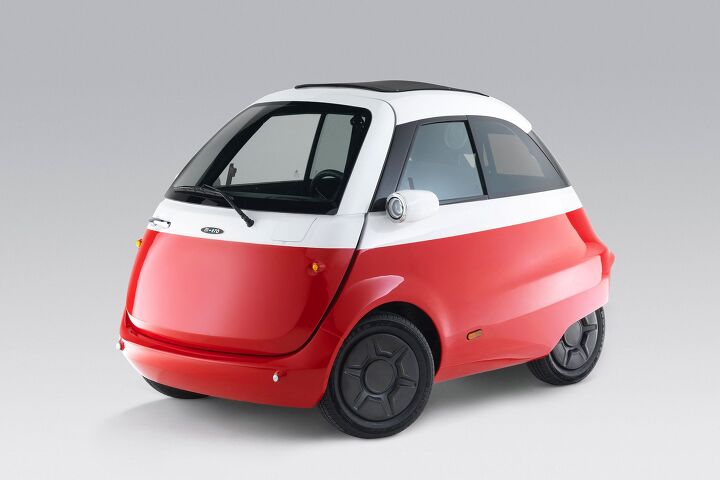The Most Interesting New Car at the Geneva Motor Show Wasn't Actually New or Technically Even a Car

Micro Mobility Systems recently strayed from producing electric scooters to build what is essentially a modern-take on the Isetta microcar called the Microlino. The Swiss firm has been bringing its enclosed quadricycle to the Geneva Motor Show since 2016, although this was the first year we’ve bothered to mention it. However, they haven’t abandoned the platform. Instead they’ve persisted, gradually approaching a point where they actually might grace public roads with the Microlino’s dainty carbon footprint.
It’s really tempting to root for little autos like this one. In addition to being adorable, they seem like the perfect solution for city dwellers who sometimes find the very idea of the traditional automobile mildly contemptible. Claims that they take up too much space or are energy inefficient can be countered with vehicles like the Microlino. Unfortunately, the odds of us ever seeing it in North America are slim.
The gumdrop-shaped transport has room for two with storage in the back for smaller items. Entry is achieved by opening the vehicles’ face, just like the classic Isetta. Bent on being a green vehicle, the Microlino uses a tiny 8.0-kWh lithium-ion battery but is still capable of an impressive 75-mile range. Shoppers can also option a 14.4-kWh unit that expands its maximum travel distance to 134 miles — more than enough for routine city use.
Micro Mobility has said the vehicle yields a of top speed of 62 mph, which is theoretically enough to take it on the highway. Although, we’d wager range becomes a bit of an issue if you have to peg the throttle in order to keep up with slow traffic. It also probably wouldn’t hold up all that well in a high-speed crash (the prototype doesn’t have seat belts but the production unit should). That might not make it a good fit for American roads but it’s hard to condemn it for that, as that wasn’t what it was built for.
It’s for parallel parking in impossibly small spaces (or just pulling in directly) and bragging to the neighbors that you have the most energy efficient vehicle in the neighborhood. We’re entering into an era where high-end manufacturers are beginning to build six-figure battery-electric sport utility vehicles. These faux-green models are truly magnificent but they also betray the whole point of moving toward electrification in the first place. They aren’t hyper-efficient eco cars for the masses — but the Microlino is. You could own one of these babies and be as comfortably smug as a Prius owner from 2004.
It’s what the world claimed it wanted when this obsession with electrification began and it is cutesy and efficient enough for skeptics to buy into it. So why won’t it sell in America? Safety issues are the biggest hurdle to get around. While it wouldn’t be marketed as a car, it still might get hit with regulatory hurdles it couldn’t possibly overcome. Average American’s also have a more-than-mild aversion to microcars.
Pricing is also an issue. Micro Mobility has said it would probably cost at least €10,000 (or about $12,500). In the United States, you could could negotiate a Chevrolet Spark for that price. Still, the company has said it’s acquired several thousand preorders already. All it has to do now is avoid becoming the European equivalent of Elio Motors. Fortunately, things appear to be more-or-less on track for Micro Mobility and the company has said production of the goofy little non-car will begin later this year.
[Images: Micro Mobility Systems]

A staunch consumer advocate tracking industry trends and regulation. Before joining TTAC, Matt spent a decade working for marketing and research firms based in NYC. Clients included several of the world’s largest automakers, global tire brands, and aftermarket part suppliers. Dissatisfied with the corporate world and resentful of having to wear suits everyday, he pivoted to writing about cars. Since then, that man has become an ardent supporter of the right-to-repair movement, been interviewed on the auto industry by national radio broadcasts, driven more rental cars than anyone ever should, participated in amateur rallying events, and received the requisite minimum training as sanctioned by the SCCA. Handy with a wrench, Matt grew up surrounded by Detroit auto workers and managed to get a pizza delivery job before he was legally eligible. He later found himself driving box trucks through Manhattan, guaranteeing future sympathy for actual truckers. He continues to conduct research pertaining to the automotive sector as an independent contractor and has since moved back to his native Michigan, closer to where the cars are born. A contrarian, Matt claims to prefer understeer — stating that front and all-wheel drive vehicles cater best to his driving style.
More by Matt Posky
Latest Car Reviews
Read moreLatest Product Reviews
Read moreRecent Comments
- Redapple2 Love the wheels
- Redapple2 Good luck to them. They used to make great cars. 510. 240Z, Sentra SE-R. Maxima. Frontier.
- Joe65688619 Under Ghosn they went through the same short-term bottom-line thinking that GM did in the 80s/90s, and they have not recovered say, to their heyday in the 50s and 60s in terms of market share and innovation. Poor design decisions (a CVT in their front-wheel drive "4-Door Sports Car", model overlap in a poorly performing segment (they never needed the Altima AND the Maxima...what they needed was one vehicle with different drivetrain, including hybrid, to compete with the Accord/Camry, and decontenting their vehicles: My 2012 QX56 (I know, not a Nissan, but the same holds for the Armada) had power rear windows in the cargo area that could vent, a glass hatch on the back door that could be opened separate from the whole liftgate (in such a tall vehicle, kinda essential if you have it in a garage and want to load the trunk without having to open the garage door to make room for the lift gate), a nice driver's side folding armrest, and a few other quality-of-life details absent from my 2018 QX80. In a competitive market this attention to detai is can be the differentiator that sell cars. Now they are caught in the middle of the market, competing more with Hyundai and Kia and selling discounted vehicles near the same price points, but losing money on them. They invested also invested a lot in niche platforms. The Leaf was one of the first full EVs, but never really evolved. They misjudged the market - luxury EVs are selling, small budget models not so much. Variable compression engines offering little in terms of real-world power or tech, let a lot of complexity that is leading to higher failure rates. Aside from the Z and GT-R (low volume models), not much forced induction (whether your a fan or not, look at what Honda did with the CR-V and Acura RDX - same chassis, slap a turbo on it, make it nicer inside, and now you can sell it as a semi-premium brand with higher markup). That said, I do believe they retain the technical and engineering capability to do far better. About time management realized they need to make smarter investments and understand their markets better.
- Kwik_Shift_Pro4X Off-road fluff on vehicles that should not be off road needs to die.
- Kwik_Shift_Pro4X Saw this posted on social media; “Just bought a 2023 Tundra with the 14" screen. Let my son borrow it for the afternoon, he connected his phone to listen to his iTunes.The next day my insurance company raised my rates and added my son to my policy. The email said that a private company showed that my son drove the vehicle. He already had his own vehicle that he was insuring.My insurance company demanded he give all his insurance info and some private info for proof. He declined for privacy reasons and my insurance cancelled my policy.These new vehicles with their tech are on condition that we give up our privacy to enter their world. It's not worth it people.”





































Comments
Join the conversation
Still too space-inefficient for everyone to use it in big cities. The only powered vehicle that really works in a city if you assume that everyone will use one is a scooter, moped, or very small motorcycle.
Can't see how this could be marketed as a car legally, but hey, I like the idea :)